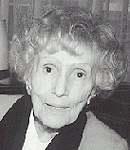Founder Marguerite Kozenn-Chajes
Marguerite Kozenn-Chajes “Mrs. Mozart” (1909-2000)
Reprinted article from 1997
Washington, D.C., Volume 50, No. 11, 1997, The Quiet Invasion Continues… “Mrs. Mozart.”
International Understanding
Through Music
by Birgit Kroon
To be active even in old age – to set objectives and to realize them! This principle is lived by Professor Marguerite Kozenn-Chajes, the founder and president of the Pro Mozart Society of Greater Detroit.
Why does the previously successful soprano work so avidly for the reputation of Mozart? Her answer: “Because the idea of humanity is nowhere so convincingly expressed as in the work of Mozart.”
One could call Mrs. Kozenn-Chajes a kind of self-appointed “propaganda activist” for Austria. Her enormous energy, her activities are unbroken. This apparently ‘timelessly’ interesting person springs from a Jewish family of old Austriaone of her uncles was the publisher of the famous “Kozenn Atlas,” another was the Chief Rabbi of Vienna, Dr. P.Z. Chajes, after whom several schools and a university were named.
Anybody inquiring after her age gets only a chuckling twitch of the shoulders and the following account: “When I was six years old, my mother, who had very ambitious goals for her children (my brother and I), insisted on instruction in several languages and in music. That’s why I got a German-Bohemian piano teacher. He was seventy-five years old and told us interesting anecdotes from the lives of Smetana and Dvorak.
But most of all he talked about Mozart in Prague. One day he told us children about the life of Mozart, that he was poor and sick, and that he was buried in a mass grave. Many decades have since passed, but I still remember how shocked I was about the mass grave. I think it became my second nature to make up for at least some of the sins committed against Mozart.”
Marguerite was born in Czernowitz, a city about which she says: “You know what it means to be born in Czernowitzhe or she was born in Austria, lived in Romania anddied in Russia without ever leaving the city!”
After graduating from a “humanistic gymnasium” Marguerite studied piano and voice. She earned her first money accompanying a choir in Vienna. After winning a prize in a voice competition, she studied in the “master class” of the Vienna Academy of Music. Her love for Mozart deepened during her studies with Bernhard Paumgartner at the Summer Academy of the Mozarteum in Salzburg.
The young soprano got her first engagement in the theater of Teplitz-Schönau, which was then directed by Rudolf Bing who later became general manager of the Metropolitan Opera in New York. She then received a contract with Vienna’s Volksoper. Opera performances and recitals in Prague, Bucarest, Paris, Rome, Milan and Jerusalem were to follow. Until Hitler put an end to these activities: a continued career in Europe became unthinkable.
Having emigrated to the U.S. in 1939, she had her debut as soloist in New York’s Carnegie Hall in Mozart’s Mass in C Major. Other successful engagements in New York and other U.S. venues followed and later on she settled in Detroit where she taught at the conservatory, gave lieder recitals and lectures and created radio programs. Her repertoire was considerable, she sang in seventeen languages including Chinese-Cantonese.
In 1946 Marguerite Kozenn-Chajes initiated a series of concerts which featured Detroit-area premieres of such Austrian composers as Helmut Eder, Gottfried von Einem and Michael Haydn.
Eleanor Roosevelt became the patron of a series in which Marguerite performed in several large and small displaced persons camps. The tour started at the Rothschild Hospital in Vienna, moved on to Salzburg and ended at the Salle Plêyel in Paris. Many of the concerts were open-air performances. The concerts attracted an audience of more than five thousand.
During one of her numerous trips she was a guest in the Vatican and, through the help of the U.S. Ambassador, was received in private audience by Pope John XXIII.
In 1958 Marguerite was asked by International Foundation Mozarteum to build up a Mozart community in the U.S. Easier said than done: Detroit is Motown not Mozart Town. Many obstacles had to be overcome. Classical music and Mozart sounds were rather unknown during those days but the influence of recent immigrants were beginning to be felt. Enough supporters were willing to join the Pro Mozart Society of Greater Detroit. With the help of friends, Marguerite was also able to found Mozart groups in Miami, Atlanta, Chicago and Toronto. She was helped a lot by the film Amadeus which spawned a veritable “Mozart Boom.”
Each year, a concert was organized by the Pro Mozart Society, thirty-seven in all. The best artists of Michigan were engaged. Each concert was followed by a reception where Austrian wines were served. An exhibition about Salzburg was also incorporated into the program.
The profits from the annual concerts were sent to the Mozarteum Foundation for the purchase of the new edition of the complete works of Mozart. In recognition of the financial support, the foundation dedicated the conductor’s score of Mozart’s The Magic Flute to the Pro Mozart Society of Greater Detroit and Marguerite Kozenn-Chajes.
Marguerite is pleased about the numerous honors bestowed upon her: they range from the Hebrew University in Jerusalem to the Max Reinhardt Medal. Through her commitment to Austria’s genius loci she is an excellent Ambassador of Austria in matters Wolfgang Amadeus Mozart. But she believes that the greatest honor is the sobriquet “Mrs. Mozart.”
